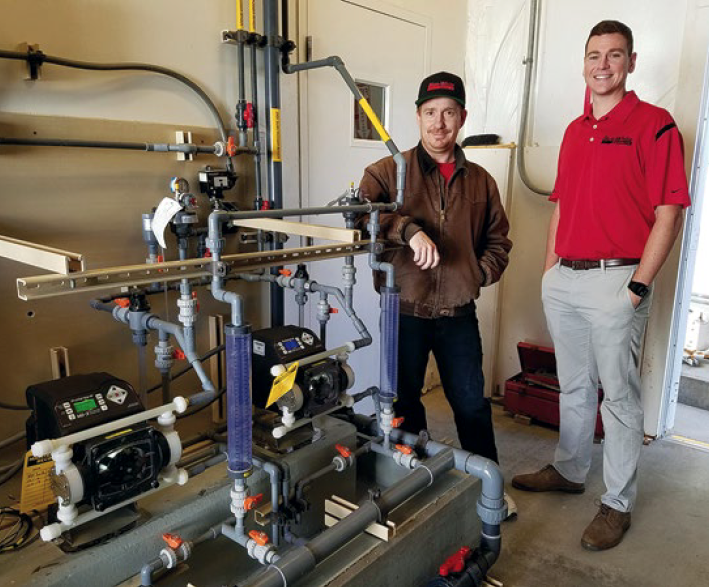
Application: Marine Corps Base Camp Pendleton is the major West Coast base of the United States Marine Corps. It is located on the Southern California coast, in San Diego County. The Camp maintains a self-sustaining water supply and sewage treatment plant to serve a population of 70,000.
Problem: Camp Pendleton has been using four diaphragm metering pumps to inject sodium hypochlorite into their finished potable water to pre- and post-chlorinate the drinking water for the base. The diaphragm pumping cycle consists of a suction and discharge phase. During the suction phase of the cycle, gaseous chemicals like sodium hypochlorite can cause vapor lock and the pump may lose prime. Priming was a challenge for the diaphragm metering pumps because this application required intermittent pumping through duty and standby metering pumps.
Another problem that presented itself with the existing diaphragm pumps that were being used was the money and time spent of doing repairs. The repair kit is costly (averaging around $1,200 per kit), the pump takes a full day to repair, and the repair is complicated and messy.
Solution: The diaphragm pumps in use at the facility were replaced with two of Blue-White Industries ProSeries-M MD-3 double-diaphragm metering pumps for beta testing. The dual-diaphragm configuration means that when the first diaphragm is in the suction phase, the second diaphragm is in the discharge phase. This helps the sodium hypochlorite to be pumped in a near continuous flow, preventing gas build up and loss of prime. Sean Donegan, water treatment specialist of ACEPEX, says, “The MD-3 pumps have a smooth consistent flow, like peristaltic pumps, especially at low feeds.”
Donegan also says that “the MD-3 pumps are less expensive than other pumps, especially when comparing spare parts cost and time to repair.” The only wearable parts on the hybrid pump is the diaphragm and the cartridge check valves. Should the PVDF diaphragm need to be replaced, the kit is about $40 to purchase and takes about five minutes to replace. To change both suction and discharge valves for each pump head, a kit is $110. These kits have a substantially lower cost and shorter repair time than the previous kits.
Result: The MD-3 succeeded in pumping the gas-forming chemical in the high pressure application, and eliminated vapor lock. The pumps injected 12.5% to 16% of sodium hypochlorite at the rate of 5-7 gph at 80-120 psi. The pumps maintained an accurate and continuous flow, providing smooth chemical dosing and eliminating the need for a pulsation dampener. Installation and setup was greatly simplified because of the pumps’ drop in place design and built in controls. Donegan believes the installation is made easy because “the wiring is simple labeled terminal blocks.”
The pumps were installed on Oct. 27, 2016, and according to Keith Regalado, Camp Pendleton’s shift operator, “The pumps have worked perfectly since the installation and are accurate and consistent.” They have been running continuously and there has been no maintenance needed.
Learn more about Blue-White ProSeries-M products at www.proseries-m.com.

Visit the Blue-White Industries Storefront





